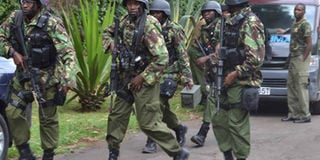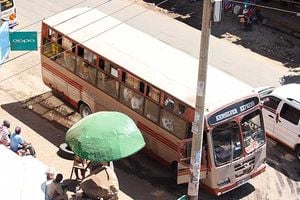Shame of slow response in 15-hour campus terror

The officers from the General Service Unit’s Recce Squad who eliminated the terrorists who killed 148 people at the Garissa University College on Thursday have not been paid their allowances. FILE PHOTO |
What you need to know:
- Security chiefs mum as questions arise over their handling of Thursday’s Al-Shabaab raid waited for seven hours to get plane to fly team to scene of attack in Garissa
- Terrorists had a field day taunting and killing 142 students before elite squad arrived
- First plane to land in Garissa from Nairobi carried minister and police boss
- President declares three days of national mourning to honour victims
- The core team landed in Garissa at 1.56 p.m.
The alarm at the Ruiru base of the Recce Company of the General Service Unit was sounded at 6 a.m. on Thursday last week.
As they gathered, officers of the elite paramilitary unit were informed that a possible terrorist attack had been launched on Garissa University College by suspected Al-Shabaab gunmen.
They quickly assembled their gear and got ready for deployment.
“It is a normal procedure when there is an emergency so that they (Recce officers) get their equipment ready and be on standby for deployment at any moment,” a senior police officer with intimate knowledge of Recce operations told the Sunday Nation.
But seven hours later the officers were still in Nairobi. After the long wait, the team would finally leave Wilson Airport after midday and finally enter Elgon hostel on the campus, the terrorists’ last stand, nearly 11 hours later.
This was long after the killing had started and a majority of the 142 young Kenyans had been slaughtered by the extremists, who knew all along that their chances of leaving the compound alive or free were slim.
The 18 GSU officers involved took off from Wilson Airport in two fixed-wing planes operated by the Kenya Police Airwing – 5YGSU and 5YPOL – at 12.30 p.m., seven hours after the alarm sounded.
A smaller back-up team had left for Garissa by road as they could not all fit in the planes with their equipment.
The core team landed in Garissa at 1.56 p.m.
Inspector-General of Police Wilson Boinnet tweeted: “All our elite response units travelled to Garissa by air.”
Mr Boinnet did not respond to our inquiries on the delay despite repeated calls and messages left on his phone.
On arrival in Garissa, the GSU team was briefed on the situation for two hours and when the ones that had travelled by road arrived, they launched the final assault on the terrorists at about 5 p.m., who they are reported to have subdued within half an hour.
The late deployment has provoked questions among Kenyans on whether the issue may have contributed to the big number of casualties and whether our security agencies learned any lessons from the 2013 Westgate Mall attack, where terrorists were out to kill as many people as they could before they themselves were killed.
It has also exposed the logistical and decision-making weaknesses that afforded the Garissa terrorists time to gather and sort their victims, laughing and taunting them as reported, and finish them off.
“They thought the military and APs on the ground could handle the situation. We were considered an afterthought. I see no difference between what happened in Westgate and Garissa. It is a repeat,” said a senior officer.
He was also critical of the decision to fly Interior Cabinet Secretary Joseph Nkaissery and Inspector-General Boinnet to Garissa before the operational team could be deployed.
“It was purely for PR. It’s not anything new for us,” he added.
EARLY DEPLOYMENT
The officer, who asked not to be named to enable him to discuss the actions of his seniors without fear of a reprimand or accusations of insubordination, told the Sunday Nation the deployment should have been made earlier.
“According to protocol, when there is an emergency, the GSU Commandant puts the Recce team on standby. He does not need to be told by anyone. However, the order for deployment must come from the Inspector-General of Police. That is a preserve of Mr Boinnet as the Inspector-General of Police,” he added.
Because of the large number of Recce officers that needed to be deployed, an helicopter could not pick them up from Ruiru. The team is understood to carry heavy equipment.
The Sunday Nation established that a decision had been made to send a team of 25 officers.
SECURITY ANALYSTS
It is the time taken to dispatch the commandos that some feel was too long and resulted in many casualties which could possibly have been minimised with a faster response.
Security analyst, retired Major Bashir Abdullahi, says security bosses failed in allowing the terrorists to drag on the siege at the university.
“Surely, why did we take that long to end the siege? Were we expecting the Al-Shabaab terrorists to negotiate for release of hostages? These guys came prepared to die in the first place and this is something the security forces should have known and hence not given more time to continue killings. We would have expected the troops to have stormed in within the first one hour and I am sure the number of casualties would have been much lower.
“Let the security forces have this in mind for any future engagement with Al-Shabaab – don’t wait too long to storm the venue. Movement should be with lightning speed and use the surprise attack to their advantage,” says Mr Bashir.
Although there were no police choppers available, the Inspector-General has power over the personnel and equipment of the Kenya Wildlife Service, the Kenya Forest Service, the Kenya Prisons Service and the National Youth Service following an order by President Kenyatta last year.
He extended it to other government agencies with facilities that police may need, including helicopters.
It is not clear why they were not available immediately since the Presidential order has not been rescinded.
The Interior ministry however said that the response time was reasonable.
“If you look at how we responded it was not bad at all, say, compared to Westgate. It takes time to assess and make the decisions, escalating it from National Security Advisory Committee to the National Security Council and then to scramble the elite units, get them to the airport and fly them to Garissa which is a two hour flight.
There were many moving parts and the nine hours it took was reasonable,” said the Interior Ministry spokesman Mwenda Njoka.
Unlike the military elite units, the Recce squad used is specialised in Close Quarter Battle (CQB), a combat technique for fighting in tight spaces such as urban areas and inside buildings.
It is useful in minimising casualties in hostage situations or circumstances such as the case in Garissa.
The deployment of the Recce unit was a careful undertaking, with decision makers keen not to repeat the errors made during the 2013 Westgate terrorist attack, in which a GSU operation was interfered with by deploying the military in the mall while under siege, resulting in deaths from friendly fire.
The Garissa mission, however, was heavily reliant on the military.
Kenya Defence Forces troops from Garissa barracks were among the first units to arrive at the college in response to distress calls from overwhelmed regular police officers.
OUTER SECURITY WINGS
In the presence of the Recce team, the military provided outer security rings, throwing a cordon stretching almost a kilometre from the campus.
A security expert told the Sunday Nation that had the call to emergency units in Nairobi been prompt, the Recce team should have been on the ground by 8 am, and thus the death toll would have been largely reduced.
But it is not the delay disturbing the elite team, the officers often complain of unpaid allowances for such risky missions, just like happened during Westgate.
The Sunday Nation established that in past cases, officers on missions outside their bases were supposed to be paid Sh3,000 as night allowance. But, in most cases, they were paid an allowance not commensurate with hours and days they were engaged in special missions. They deem this a heavy blow to their morale, especially because they follow tight orders and are not supposed to question their commanders.
In Garissa, seven of them were injured and one later succumbed to his injuries.
Recce’s professionalism won President Kenyatta’s heart because after Westgate, he visited them at their headquarters in Ruiru to thank them for their work.
During the visit, a bull was slaughtered and the officers had lunch with the President.
Regarding the Garissa incident, pictures obtained by the Sunday Nation showed four terrorists sprawled on different spots on the floors, with their AK-47 assault rifles by the side.
They also had pouches that are used to carry extra magazines strapped on them.
They had suicide vests, but were felled before they could detonate them.
Other sources said the fifth terrorist managed to blow himself up and the explosion resulted in injuries to security officers.
It was evident from the photos that they were hit by highly skilled snipers, because their bodies were not riddled with multiple bullet wounds.
Even as critics complained about the logistical plans for elite units, Mr Nkaissery’s description of the attack as a surprise was also contentious.
The Sunday Nation established that prior to the attack, local police had received intelligence of an impending attack. The intelligence brief gave the possibilities that either the university, or the medical training college in the same area, would be attacked.
Four police officers were deployed at the university to provide security.
An officer was among the first victims of the attack.
On Friday, Maj-Gen (rtd) Nkaissery said: “This incident which happened today is one of those incidents which can surprise any country.”
Judging by security actions that preceded the attack, it was clear the government was aware of the threat, particularly targeting institutions of higher learning.




